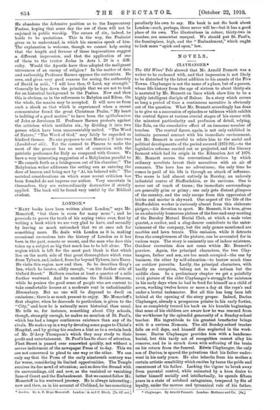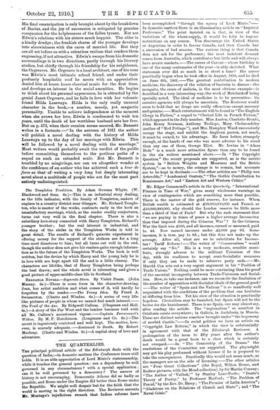NOVELS.
CLAYEFANGER.*
The Old Wives' Tale showed that Mr. Arnold Bennett was a writer to be reckoned with, and that impression is not likely to be disturbed by the latest addition to his annals of the Five Towns. Clayhanger is not the name of a place, but of a person, whose life-history from the age of sixteen to about thirty-six is narrated by Mr. Bennett on lines which show him to be a highly intelligent disciple of Balzac. In a story which covers so long a period of time a continuous narrative is obviously out of the question. What Mr. Bennett accordingly has done is to give us a succession of episodes or tableaux which exhibit the central figure at various crucial stages of his career with the minutest particularity and profusion of detail, relying, like Zola, on the cumulative effect of an immense number of touches. The central' figure, again, is not only exhibited in intimate personal contact with his immediate environment, but Mr. Bennett is careful to relate him to the social and political developments of the period covered (1872.92),—to the legislative reforms carried out or projected, and the literary ferment which had its origin in the Education Act of 1870. Mr. Bennett scorns the conventional devices by which ordinary novelists invest their narratives with an air of romance. The hero has no adventures ; the only time he comes in peril of his life is through an attack of influenza. The scene is laid almost entirely in Bursley, an unlovely industrial centre of Staffordshire, or its environs. One is never out of reach of trains ; the immediate surroundings are generally grim or grimy ; one only gets distant glimpses of the country, and the only escape from this oppression of bricks and mortar is skyward. One aspect of the life of the Staffordshire worker is curiously absent from this elaborate pictive,—his devotion to sport. Mr. Bennett, it is true, gives us an admirably humorous picture of the free-and-easy meeting of the Bursley Mutual Burial Club, at which a male voice quartet, a reciter, and a clog-dancer contribute to the enter- tainment of the company, but the only games mentioned are marbles and lawn tennis. This omission, while it detracts from the completeness of the picture, can be accounted for in various, ways. The story is eminently one of indoor existence. Outdoor recreation does not come within Mr. Bennett's purview. Again, the principal characters, the two Clay- hangers, father and son, are too much occupied—the one by business, the other by self-education—to bestow much time on outdoor pursuits. Lastly, the principal characters, with hardly an exception, belong not to the artisan but the middle class. In a preliminary chapter we get a painfully vivid picture of the elder Clayhanger's struggle for existence in his early days when he had to fend for himself as a child of seven, working twelve hours or more a day at the rope's end under a brutal taskmaster. But all this has long been left behind. at the opening of the story proper. Indeed, Darius Clayhanger, already a prosperous printer in his early forties, has so completely turned his back on his humble beginnings that none of his children are aware how he was rescued from the workhouse by the splendid generosity of a Sunday-school teacher. His ingratitude to his greatest benefactor brings with it a curious Nemesis. The old Sunday-school teacher falls on evil days, and himself dies neglected in the work- house Darius Clayhanger provides him with a handsome burial, but this tardy act of recognition cannot allay his remorse, and he is struck down with softening of the brain on his return front the funeral. Edwin Clayhanger, the only son of Darime is spared the privations that his father under- went in his early years. He also inherits from his mother a certain artistic sensibility which excites by, turns the pride and resentment of his father. Lacking the vigour to break away from parental control, while animated by a keen desire to better himself socially and intellectually, he spends fifteen years in a state of subdued antagonism, tempered by fits of loyalty; under the morose and tyrannical rule of his father.
• Clayhanger. By Arnold Bennett. London: Methuen and Co. Celia His final emancipation is only brought about by the breakdown of Darius, and the joy of succession is mitigated by genuine compassion for the helplessness of the fallen tyrant. Nor are Edwin's relations with his sisters much happier. The elder is a kindly drudge ; the freakish charm of the younger develops into shrewishness with the cares of married life. But they are all set before us with a relentless realism that renders them engrossing, if not attractive. Edwin's escape from his domestic surroundings is in two directions, partly through his literary studies, but chiefly through his friendship for his neighbours, the Orgreaves. Mr. Orgreave is a local architect, one of his sons was Edwin's most intimate school friend, and under their profusely hospitable roof he meets with an appreciation denied him at home, hears classical music for the first time, and develops an interest in the social amenities. He begins to think about his personal appearance, he is attracted by the genial Janet Orgreave, and he falls in love with her volcanic friend Hilda Lessways. Hilda, is the only really unusual character in the book,—a sombre, moody, yet magnetic personality. Unable to achieve independence at the moment when she avows her love, Edwin is condemned to wait ten years, until the death of her worthless husband sets her free. But on p. 573, when their reunion seems assured, Mr. Bennett writes in a footnote :—" In the autumn of 1911 the author will publish a novel dealing with the history of Hilda Lesswaya up to the day of her marriage with Edwin. This will be followed by a novel dealing with the marriage." Most writers would probably await the verdict of the public before committing themselves to the perilous paths of a sequel on such an extended scale. But Mr. Bennett is troubled by no misgivings, nor can we altogether wonder at the confidence-of an author who has achieved such a tour- de force as that-of writing a very long but deeply interesting novel about s. multitude of people who are for the most part entirely undistinguished.















































 Previous page
Previous page